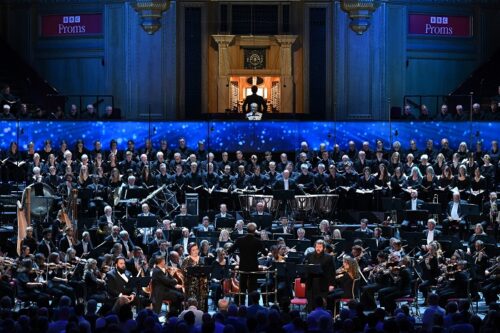
 United Kingdom BBC Proms 2022 [24], Prom 59 – Elgar, The Dream of Gerontius: Allan Clayton (Gerontius), Jamie Barton (Angel), James Platt (Priest/Angel of the Agony), London Philharmonic Choir, Hallé Choir, London Philharmonic Orchestra / Edward Gardner (conductor). Royal Albert Hall, London, 31.8.2022. (KMcD)
United Kingdom BBC Proms 2022 [24], Prom 59 – Elgar, The Dream of Gerontius: Allan Clayton (Gerontius), Jamie Barton (Angel), James Platt (Priest/Angel of the Agony), London Philharmonic Choir, Hallé Choir, London Philharmonic Orchestra / Edward Gardner (conductor). Royal Albert Hall, London, 31.8.2022. (KMcD)

Big-scale choral works are back with a vengeance at this year’s BBC Proms, and understandably so. After the cautious return of modestly sized choirs last year – perfectly suitable for the Baroque pieces that were programmed – for 2022 the Proms have pulled out all the stops and given audiences a series of choral blockbusters that were out of the question in both 2020 and 2021 because of the imposed restrictions due to the pandemic.
Verdi’s Requiem certainly made its mark on the first night, whilst last week’s performance of Mahler 2 with the London Symphony Orchestra and Sir Simon Rattle was nothing short of sensational (review click here). It was the kind of evening concertgoers will be talking about for many years to come, but it is worth reiterating the point that while the Royal Albert Hall has its detractors as a performance space for certain sections of the repertoire, for these large scale works it is the perfect venue.
This Prom was one of the most eagerly-anticipated of the season as it brought together a conductor steeped in Elgar’s idiom, Edward Gardner, and a trio of soloists that would be hard to better anywhere. Add into the mix the London Philharmonic Orchestra, who are currently playing at the top of their game under their new music director, and the massed choirs of the LPO and Hallé, and you have all the necessary ingredients required to do justice to Elgar’s most popular oratorio.
It is only fair to be said that Elgar’s post-Wagnerian soundscape, allied to Cardinal Newman’s highly-perfumed text that positively drips in Catholicism from every syllable, is not to everyone’s taste. It is a peculiar, yet heady mix of sacred heavy-breathing and devotion – of spirituality and, on occasion, banality. For us non-believers in the audience, there is a danger to come away feeling as though you have accidently walked into the path of a low-swinging thurible, yet this performance managed to avoid these pitfalls, due in no small part to Gardner’s take on the score.
He led an ardent, spiritual account of the work – from the opening bars he drew lithe playing from the strings, and bright, open sounds from the brass which set the tone for the entire performance. For a piece that can so often become self-indulgent in the wrong hands, Gardner fully had the measure of it. The playing was secure and alive to every nuance of the score.
Both choirs covered themselves in glory, indeed it is a long time since I have heard such thrillingly-voiced choral singing. Elgar often makes impossible demands of his choral forces, especially in the demons’ chorus in the second part, but these choristers barely batted an eyelid at the tricky, dense contrapuntal nature of the writing. Whether singing in barely a whisper as sepulchral deities, or exalting God at full throttle in ‘Praise to the Holiest, in the height’, their musicianship and perfect tuning shone in every single bar. Kudos to both chorus masters – Matthew Hamilton (Hallé) and Neville Creed (LPO) – for preparing both choirs so well.
Jamie Barton, a favourite with Proms’ audiences, was singing her first Angel, and given this it is only fair to say her interpretation is already mightily impressive. Her gloriously-produced mezzo voice is more ‘operatic’ than we tend to hear in this role, and once passed a tendency to be over strident to begin with, she settled down to give an achingly-beautiful interpretation. Her parting ‘Softly and gently’ to Gerontius’ soul was cathartic in its simplicity. The hypercritical may argue it could have benefitted from a sense of otherworldliness that was missing, but this will surely come. Barton is a treasurable artist and hearing how she develops her interpretation of the years will be fascinating.

James Platt was sonorous as both the Priest and the Angel of the Agony, and it was good to hear a genuine bass in the role. Last, but by no means least, is Allan Clayton’s towering performance as Gerontius. It is sometimes quite hard to write in measured tones about this exceptional artist, but it is only fair to say that not only did he sing every note as if his life depended on it, but also brought the most astonishing range of vocal colours to the role that I have ever heard in a live performance. In portraying the elderly, dying Gerontius he sang with almost a covered tone – which was perfectly in tune with the character. In the second part, as his soul starts his journey to the afterlife, there was an aliveness and vibrancy to his singing that was all at one with Gerontius’ soul. His perfectly poised, effortlessly delivered ‘Take me away’ set the seal on a remarkable performance, that was nothing short of a privilege to witness.
Keith McDonnell
